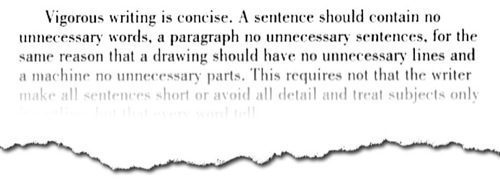A reader e-mailed me his cover letter. I agreed to send him some suggestions in exchange for permission to put some of them into a blog post. So: this cover letter is 100% real (except for the redacted parts) and 100% posted with permission.
April 25, 2013
Morgan Edge
News Director, WGBS
2 Main Street
Metropolis
Dear Morgan:
It was a pleasure meeting you briefly late last year when you came to give a talk at Metropolis University to the master’s in journalism class. I’ve now completed the program and am looking for job opportunities in news reporting.
I’ve a curious and critical mind with regards to news judgment and the experience of working in fast-paced newsrooms through internships in Metropolis at WKRP, WXYZ and KBBL. I’m also very comfortable using an ENG camera and with computer programs including iNEWS, QNews, Avid, Final Cut Pro, Photoshop and Adobe Audition.
As you can see on my blog and in the demo reel, I’ve covered a wide range of stories – from human trafficking and the grassroots INM movement, to a local dance group chosen to perform at the 2012 London Olympics.
My work was recently recognized by the Metropolis Association of Journalists. A short documentary I hosted and co-produced on voter apathy has been selected as a finalist for the 2012 Student Award of Excellence.
Please find my resume attached for further details on my background.
The reasons I would like to work at WGBS are the focus on local stories and that an independent station is able to successfully compete with the big networks in Metropolis. I would love to speak with you regarding what I’ve to offer and possible opportunities with WGBS.
Thanks for your time. I look forward to hearing from you soon.
Sincerely,
Jimmy Olsen
Okay, Jimmy, so this is not an objectively bad cover letter. I count exactly zero “to whom it may concern”s and no “it is my pleasure to apply for the open position of” crap.
It’s also great that you have a contact at WGBS to address your letter to, because it looks as if WGBS doesn’t have any open postings at the moment and you’re applying “cold” in case there just happens to be an opening at the time your cover letter and resume crosses Morgan’s desk. However…did you actually meet this guy, or were you one in a hundred students who filed through to shake his hand after his talk? The former will help you get much farther. The latter, not so much, but it probably can’t hurt. Either way, applying cold like this is a long shot, but you’ve got little to lose.
But because you have little to lose, you may want to try taking more risks. This cover letter isn’t bad, but it’s also not awesome. Your second paragraph detailing your qualifications tells me little more than I can find in your resume. Presumably your resume will also list your awards (4th paragraph), so the only paragraphs that tell me something new about you are the third and fifth.
As for the fifth graf (“The reasons I would like to work at WGBS…”) Your heart’s in the right place, but this feels forced. Actually, forced isn’t the right word. It feels slotted in, as if the rest of your cover letter is a template. (Jimmy, you sent me two cover letters, and each is relatively different, so perhaps this cover letter is not a template–but that’s how this paragraph feels.) Don’t leave this bit til the end.
And as for your reporting chops…you’re a student who covered human trafficking? Say that again. Human trafficking? Okay, Jimmy, I’m not Morgan Edge and I don’t know what’s running through his head, but holy cow, I would want to know more about this. Again, you have little to lose. What about putting this shit right up top there? Maybe not above your hello to Morgan (depending on how thoroughly you actually met this guy), but right the hell below it. How did reporting on human trafficking affect you? What was it like? What did you learn? Tell a story with your cover letter. Don’t necessarily skip over your qualifications, but Morgan can look at your resume for details. Maybe you want to dedicate two paragraphs to human trafficking and a sentence to your internships, tech skills and awards.
Anyway, that’s what I’d do. What do you have to lose?




